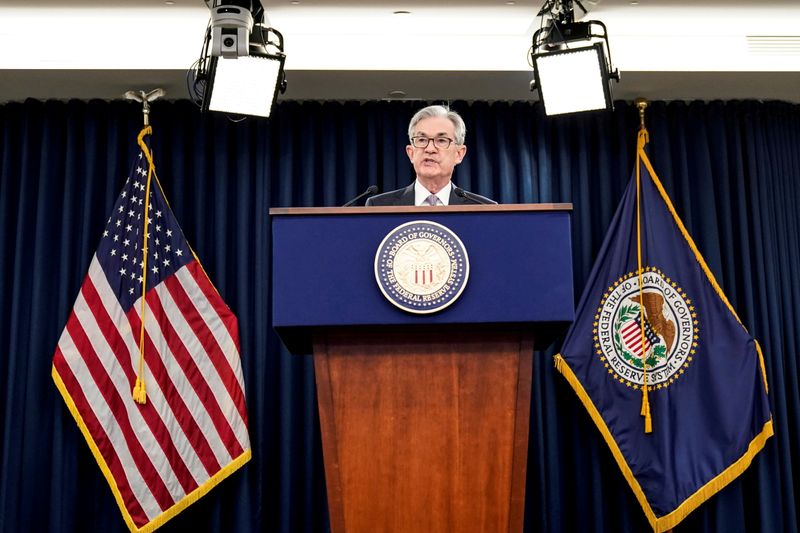By Kate Duguid
NEW YORK (Reuters) - Investors have received some reassurance that the Federal Reserve will not imminently reduce its support of the U.S. economic recovery, but they expect the Fed to provide more concrete clues on a tapering of bond purchases in the months ahead.
At the conclusion of the U.S. central bank's latest policy meeting on Wednesday, Fed Chair Jerome Powell acknowledged the economy's growth, but said there was not yet enough evidence of "substantial further progress" toward recovery to warrant a change in policy. The Fed has been purchasing $120 billion of government-backed debt a month since June 2020, but is expected to reduce that as the economy improves.
Powell "has said in the past that he will give markets a heads-up well in advance of when they expect to taper. If you want to give a heads-up you need to be really certain the economy is on track to reach substantial progress," said Tiffany Wilding, North American economist at PIMCO. "I don't think you have that today."
Though Wednesday's comments were largely anticipated, investor fears that strong U.S. economic data would force the Fed to taper its debt purchases sooner than expected helped push Treasury yields up dramatically in the first quarter.
Some analysts have harked back to the 2013 taper tantrum when Fed chief Ben Bernanke told lawmakers the central bank could slow its pace of asset purchases that had been propping up markets, sending yields sharply higher.
Wilding noted that the Fed's comments following this week's policy meeting made clear that any decision to begin to talk about tapering would be contingent not only on economic data but on evidence "the pandemic is behind us."
"The virus will need to continue to be controlled for us to achieve those economic goals," Powell said during Wednesday's news conference.
Reassurance of continued demand for Treasury debt from the Fed pushed Treasury yields lower on Wednesday, with the 10-year yield down roughly 1 basis point to 1.611% while the dollar index, which measures the greenback against six major currencies, fell 0.38% to 90.552.
PATH TO TAPER
Analysts and investors are debating the timeline to a taper.
Wilding believes that if there is substantial progress on vaccinations and the economy, the Fed could give the market a heads-up at its next meeting, on June 15-16. If the Fed follows the same schedule used in 2013, actual tapering would start about six months later, in December, she said.
Brian Coulton, chief economist at Fitch Ratings, sees a similar timeline. "We now think the Fed will start to discuss tapering over the summer, but the actual taper probably still won't happen until the turn of the year."
A note from ING said that the Fed's "more upbeat assessment on the outlook" already hints at the first steps on the path toward tapering.
Some expected a longer process.
Guy LeBas, chief fixed income strategist at Janney Capital Management, expects a tapering heads-up in September and a policy announcement in January 2022.
"It's long enough to have good confidence whether this spurt of growth will reverse. It gives time to discuss the idea in more detail at the Jackson Hole conference," said LeBas, referring to the Fed's annual August gathering of policymakers, central bankers and others from around the world.
TD Securities rates strategist Gennadiy Goldberg believes the Fed will start to discuss tapering this summer or early fall, and announce the policy in March 2022.
Powell also said the Fed was looking carefully at the structure of the Treasury market as dealers commit less capital to government debt and supply is growing.
BlackRock (NYSE:BLK)'s chief investment officer for fixed income, Rick Rieder, said that while "tapering will come at some point," the Fed is "very sanguine about continued infusions of liquidity into the system given the current context."
The Fed's stimulative policy has been criticized by some investors as promoting frothiness – a ballooning in price untethered to an asset's economic fundamentals. U.S. stock indexes have repeatedly hit new highs since the Fed's intervention at the start of the pandemic.
Powell acknowledged that on Wednesday, saying, "Some of the asset prices are high."

"You are seeing things in the capital markets that are a bit frothy," Powell said. "That's a fact. I won't say it has nothing to do with monetary policy, but also it has a tremendous amount to do with vaccination and the reopening of the economy."